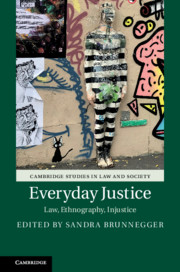Book contents
- Everyday Justice
- Cambridge Studies in Law and Society
- Everyday Justice
- Copyright page
- Contents
- Contributors
- Acknowledgments
- Chapter One Theorizing Everyday Justice
- Part One Im/possibilities of Everyday Justice
- Part Two The Force of Everyday Justice
- Part Three Everyday Justice Unbound
- Chapter Six Troubled Currents and the Contentious Moral Orderings of Drakes Estero
- Chapter Seven Everyday Justice at the Courthouse?
- Chapter Eight Ever in the Making
- Afterword
- Index
- Cambridge Studies in Law and Society
- References
Chapter Eight - Ever in the Making
Actors and Injustice in a Papua New Guinea Village Court
from Part Three - Everyday Justice Unbound
Published online by Cambridge University Press: 28 November 2019
- Everyday Justice
- Cambridge Studies in Law and Society
- Everyday Justice
- Copyright page
- Contents
- Contributors
- Acknowledgments
- Chapter One Theorizing Everyday Justice
- Part One Im/possibilities of Everyday Justice
- Part Two The Force of Everyday Justice
- Part Three Everyday Justice Unbound
- Chapter Six Troubled Currents and the Contentious Moral Orderings of Drakes Estero
- Chapter Seven Everyday Justice at the Courthouse?
- Chapter Eight Ever in the Making
- Afterword
- Index
- Cambridge Studies in Law and Society
- References
Summary
This chapter explores the workings of a village court in the town of Bialla, Papua New Guinea. Through an examination of various actors (including a flag, chair, and summons) and the journeys they take, the chapter illustrates how a village court materializes as a place of authority, able to facilitate justice. This discussion also reveals how relationships sit at the heart of the disputes brought to the court, and why disputants emerge as court-making actors themselves. By examining a single village court in granular detail, this chapter is able to argue that networks of relationships are key to both the existence of the village court and the justice that is sought within them.
- Type
- Chapter
- Information
- Everyday JusticeLaw, Ethnography, Injustice, pp. 182 - 205Publisher: Cambridge University PressPrint publication year: 2019
References
- 1
- Cited by

